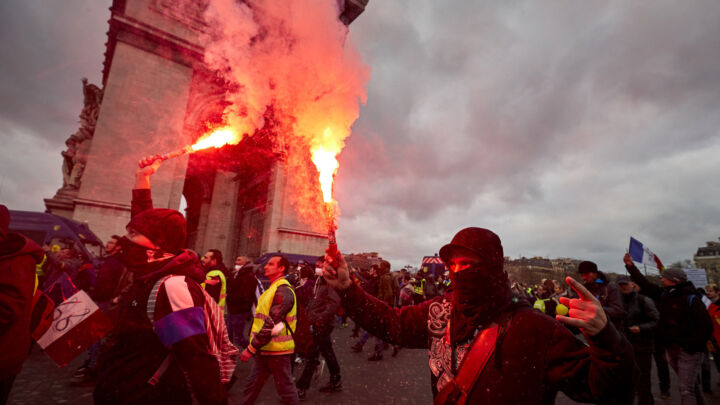
Long-read
ISIS: haunted by sovereignty
At the heart of the Islamic State is a fear of political autonomy.
Want unlimited, ad-free access? Become a spiked supporter.
In an English-language video released soon after the Islamic State (ISIS) proclaimed its caliphate last year, a Chilean convert is shown kicking over and trampling a sign demarcating the border between Iraq and Syria. By its title, ‘The End of Sykes-Picot’, the video refers to the famous and initially secret agreement between Britain and France, signed in 1916, to carve up the Middle East among themselves, once the Ottoman Empire had been defeated in the First World War. Jumping back and forth across the now invisible line dividing these former Ottoman provinces, the Chilean seems to be announcing the return of a caliphate lost during the Great War. Yet, as we shall see, the political claims made in the video, as well as by the emergence of the Islamic State itself, are everywhere belied by ISIS’s rhetoric and practices. What if the brutality of ISIS derives not from its claim to politics but the reverse, by the fact that it is unable to assume a political identity?
Speaking directly to camera, the video’s narrator proceeds to take us on a tour of a captured military base. Several bound prisoners, soldiers from the Syrian army, are shown inside the facility. The narrator chats amiably with a few of them, each identified by his sectarian identity. We then leave the building with the Chilean, who continues his smiling, TV presenter’s patter in the SUV, out of which he eventually climbs to get a good view of the prison in the distance. And, as he burbles on, we see the military base blown up with all those inside. What’s important about this video is that it refuses to define anything it depicts in a recognisably political way. Unlike the ‘political’ conventions of terrorist propaganda, such as the militant’s communiqué and list of demands, or the captive’s confession and execution, this video takes the form of a documentary whose presenter finds everything interesting and even amusing. But there is no indignation or even regret for the ‘unfortunate necessity’ that tends to accompany terrorist attacks.
Portrayed in the most detached fashion, the events of the video are treated as if they were quite banal in character, and thus lacking in the distinction from everyday life that usually characterises political as opposed to social acts. The prisoners are killed without any ceremony, while neither the narrator nor his car and driver seem to possess any official status. Even the initial scene, in which the Iraqi-Syrian border is erased, may be interpreted as an elimination of the state and, therefore, politics as such. One reason why such an explanation makes sense relates to the history of Islamist movements, which at least in the Sunni tradition have tended to be suspicious of both politics and the state. For emerging as they did, either under colonial rule or in the sometimes secular but authoritarian nation states that succeeded it, such movements sought to limit the inroads of modern politics into Muslim societies.
Islam against the state
Islamists were critical of the modern state, whether manifested in a democracy or dictatorship, because they thought its desire for sovereign power would subordinate the sacred law to the transient whims of individuals and assemblies. This was considered dangerous because such forms of human authority could never be truly sovereign, in the sense of possessing that absolute and legitimate power that the legal concept of sovereignty demanded. This is why Islamists thought to reserve sovereignty for God, and make of government only a fulfillment of divine commandments – a kind of management of society in which men were ruled by the sacred law rather than by other men. Like other colonised intellectuals, Islamists in the early 20th century often took their cue from anarchism or Bolshevism, with its theory of ‘the withering away of the state’. But, in more recent times, some have turned to a neoliberal model of social management by the market.
In both anarchist and Bolshevik inflections of Islamism, government was reduced to governance, and the state deployed in an active role only in the beginning, to replace man’s sovereignty by God’s, just as Marxism’s ‘dictatorship of the proletariat’ was meant to displace the capitalist state before dissolving it entirely into Lenin’s ‘administration of objects’. The problem with this deeply society-centric and anti-political vision was that it could never quite suppress the need or desire for sovereignty, which in Islamist narratives came to be understood as the most cardinal of sins, that of attributing partners to God or, indeed, claiming divine status for oneself. Refusing, as Islamists did, to recognise or institutionalise sovereignty, they tended to manifest it in disavowed and, therefore, opportunistic forms of violence. For it has never been possible to establish a society on the basis of law alone, one in which sovereign power has been eliminated.
These paradoxical visions of an Islamic state were in vogue until the end of the Cold War, when all such ‘ideological’ ways of thinking about particular societies were put at risk with the collapse of the Soviet Union, the decline of its Third World clients and the emergence of a global arena for what came to be called ‘new social movements’. While, in some places, neoliberal ideas about Islamic governance took the place of older narratives about revolutions and constitutions, in others a new kind of militancy emerged out of authoritarian or lawless contexts. Of these the chief one was, of course, al-Qaeda, a global movement that has always refused to adopt the model of a state. As such, its dealings with sovereignty have been vested not in territories and institutions but individuals, and in particular the iconic figure of the suicide bomber who both kills and dies to embody power in all its purity, with nothing left over from the act of violence.
The logic of mirrors
Yet, like every other form it takes, the individualisation of sovereignty has to be disavowed, since it, too, threatens to usurp that which belongs to God alone. And this might be one reason why al-Qaeda’s acts are justified not simply by the sacred law they are meant to uphold, but as the mirror images of Western attacks on Islam. This logic has become gruesomely familiar: we kill your civilians, including women and children, as you do ours. Beyond trying to disclaim responsibility for violence, then, al-Qaeda’s ubiquitous logic of mirroring is important because it defers and displaces the sovereignty of its own actions on to those of its enemies. Militant actions are seen as being negative in character and so deprived of ontological weight, with any positive identity they happen to possess derived from the deeds of their enemies. Only in this indirect way, it seems, are they capable of partaking in a sovereignty that must otherwise be repudiated.
Al-Qaeda’s de-territorialised arena of operations, however, marked by individualised if indirect forms of sovereignty, was put at risk by the West’s so-called war on terror. While this war was seen as being unprecedented in its global nature, it actually managed to re-territorialise Islamic militancy. That is, by attacking Afghanistan and Iraq, the US and its allies defined its enemy in conventional ways, as rivals for the control of territory. Out of this emerged not only insurgencies of a more or less familiar kind in both countries, but also a movement such as ISIS, which rejected al-Qaeda’s unfixed position in the global arena, founding instead a new state to which it gave the hoary title of a caliphate. While ISIS continues to draw on the repertoire of its predecessors, making use of communiqués and confessions as much as suicide bombers and practices that mirror those of its enemies, these have all taken on a novel meaning if not lost one altogether.
The American journalist James Foley was repeatedly waterboarded and dressed in an orange jumpsuit before ISIS executed him last year, but for no other reason than to imitate what the US did with its jihadi suspects. So Foley’s waterboarding was a form of torture that didn’t seek to extract any information; and his orange jumpsuit was a way of marking him out in the event of an attempted escape with no prospect of him ever escaping. This truncated form of mimicry suggests that ISIS no longer derives ontological meaning from the West, not least because this mimicry is overshadowed by other forms of execution, such as the burning alive of a Jordanian pilot in a cage or the casting of homosexuals from rooftops, which do not invoke the logic of mirroring. Similarly, the ISIS suicide bombers have ceased to be iconic figures drawing an indirect sovereignty from their enemies.
For al-Qaeda, Islam was represented by the medieval flummery on view in militant forms of dress, speech and habit, which rehearsed the sovereign gestures of an imagined past in a kind of fancy dress. But these displays were always mixed up with other traditions of sovereign action, from the military fatigues of regular and would-be armies, to the Kalashnikovs of earlier terrorist movements. ISIS retains much of this repertoire, to which it adds objects like the white trainers or running shoes common to American and European gang culture, as popularised in rap-music videos, and ninja-style black costumes from Hollywood films (both forms of dress were legitimised by ISIS founder Abu Musab al-Zarqawi during the American occupation of Iraq). In other words, the evolution of militant symbolism seems to proceed in two directions simultaneously: on the one hand, the conventionally political language of the state and, on the other, a social rhetoric of popular culture and crime.
Despite its establishment of a state, ISIS, I believe, is still characterised by the old Islamist obsession with society or social order and self-regulation. This might be why its claims to sovereignty are so ambiguous, from a largely silent caliph attributed with little or no command and charisma, to violence exercised in ways that do not distinguish between the social and the political, between the everyday and the exceptional, and, indeed, refuse to lend the political any autonomy at all. If anything, ISIS derives its own indirect and disavowed sovereignty from its Shia enemies, embodied as they are by the Islamic Republic of Iran. For, unlike its Sunni peers, the Shia version of Islamism embraces sovereignty and so politics, allowing for the suspension and even abrogation of the sacred law in the name of national interest or welfare (maslaha). In the heavily sectarian rather than anti-Western narrative that defines ISIS, therefore, the caliph serves as an antithesis to Iran’s supreme leader, while the sahaba, or companions of the Prophet, are made counterparts to the sinless imams of the Shia.
This sectarian narrative emerged soon after the Iranian Revolution in countries like Pakistan, and ties Islamic State to its Shia alterego, the Islamic Republic, in a parasitical relationship of deeply anxious and therefore violent intimacy. After all, the task of Sunni sectarianism is to inveigh against what it considers Iran’s attempt to usurp God’s sovereignty by associating partners like the imams or supreme leader with it. And yet Sunni sectarianism can only do so by imitating the very innovations that such sectarianism abhors, with ISIS deploying its own anti-imams and anti-supreme leaders against Shia Iran, which, because of its institutionalisation of a clerical establishment and belief in the continuity of divine authority in a line of imams, is the only country to have defined an Islamic politics in fully sovereign terms. Like the mirroring rhetoric of al-Qaeda, this process of negative imitation imbibes a disavowed sovereignty from the world of its enemies, but in a way that constantly threatens to collapse one into the other, which may be why the Shia are characterised primarily by their deception in ISIS narratives.
A secret sovereignty
If ISIS’s rhetoric is so consumed by the threat of Shia deception, this is surely because it recognises the latter’s seductive power. Traditionally linked to the Shia doctrine of dissimulation or taqiya, Shia deception obliged its followers to assume Sunni attitudes when they were in a minority or under threat. This emphasis on secrecy has, in the past, lent support to an esoteric view of religion, whereas, in more recent times, it has been considered a gesture of courtesy towards dominant social norms. But sectarian polemics have tended to paint it in the colours of hypocrisy, if not treachery, and deception in ISIS rhetoric has in fact come to represent the most important threat it faces, as well as the chief accusation it makes against enemies of all kinds. While the Shia might constitute the most depraved form of deception and hypocrisy, these have now assumed a more general salience in the demonology of ISIS. But why is ISIS obsessed with deception and hypocrisy?
ISIS’s fear of all that is concealed, and its concomitant desire to render everything transparent, suggests, I think, a deep anxiety about the sovereignty it disavows. The social visibility ISIS demands is always placed under the name of the law, insofar as every one of its actions, however bizarre and repugnant, is justified and indeed glorified by invoking scriptural precedent. What remains invisible, therefore, is not only outside or against the law, but, by that very fact, something that transcends its purely social realm. Included in this transcendence is, of course, God as the sovereign power who founds the law and exists beyond it, and the political sovereignty that Islamists have always suspected of usurping God’s place. If ISIS is therefore obsessed with transparency, to the degree of publicising even its most revolting acts, this has to do not simply with the requirements of propaganda, but also a will to reduce everything to the social.
Any deed that looks like it might partake of sovereignty must be made fully visible socially by being placed under the name of the law, as if in a kind of exorcism where ever more excessive forms of violence are rendered into everyday habits and thus deprived of transcendence. But the fact that such actions have to be made increasingly and inventively brutal indicates that the exorcism needs to be repeated at higher and higher levels. It’s as if the sovereign power hidden in Shia and other forms of hypocrisy might seduce the practices of the pious, which thus must constantly be brought to light by rehearsing and dispelling its transcendence. ISIS refuses the transcendent form that sovereignty takes in both its religious and political forms. Not only is its caliph a person lacking such sovereign power, so are the apocalyptic themes for which ISIS has become famous. For the end of law and society invoked by the apocalypse are countered by a banal narrative of state building and everyday virtues in the movement’s glossy online magazine, Dabiq, named after the site of the messiah’s return at the end of time, but filled with stories of children’s schools and well-regulated markets in Raqqa.
Indeed, al-Qaeda’s language of sacrifice has been replaced in the Islamic State by one of pleasure. Militants are now promised not the virgins of paradise after the final battle, but the services of jihadi brides and sex slaves in Mosul and Raqqa, together with the villas and swimming pools that have always featured prominently in the movement’s propaganda. But such pleasure is also subordinated to the law, hence the gruesome descriptions of militants explaining to the women they have enslaved how their rape is legally justified. If even this most intimate and commonplace form of sexual violence must be given the name of law, then any act may harbour a sovereignty that must be exorcised by making it socially visible. It is the continuous rehearsal and repression of this suspect desire that defines the narrative of ISIS militancy, making the struggle of the social against the political the very principle of its movement.
Faisal Devji is a reader in Modern South Asian History at St Antony’s College, Oxford.
You’ve hit your monthly free article limit.
Support spiked and get unlimited access.
Support spiked and get unlimited access
spiked is funded by readers like you. Only 0.1% of regular readers currently support us. If just 1% did, we could grow our team and step up the fight for free speech and democracy.
Become a spiked supporter and enjoy unlimited, ad-free access, bonus content and exclusive events – while helping to keep independent journalism alive.
Monthly support makes the biggest difference. Thank you.







Comments
Want to join the conversation?
Only spiked supporters and patrons, who donate regularly to us, can comment on our articles.